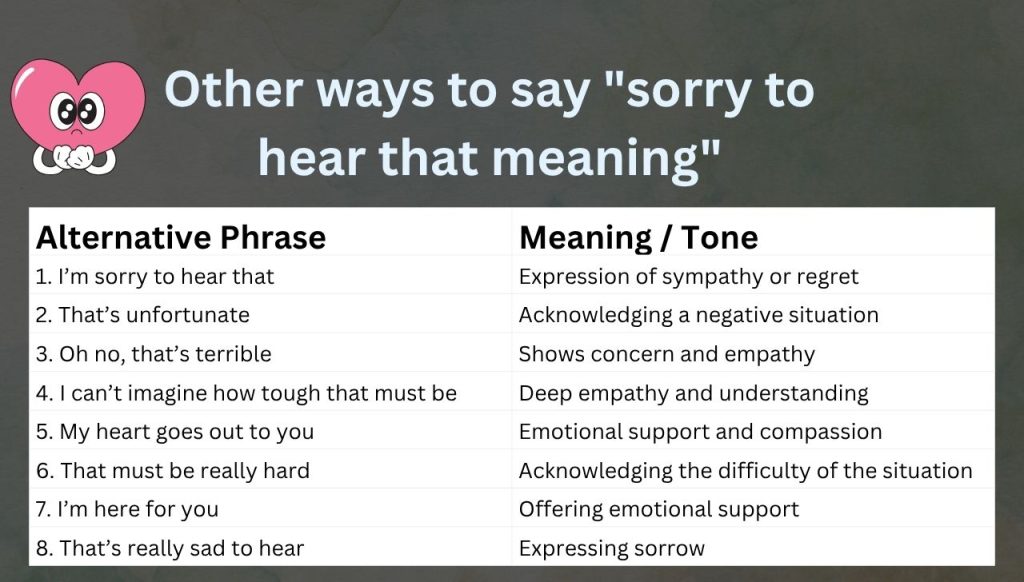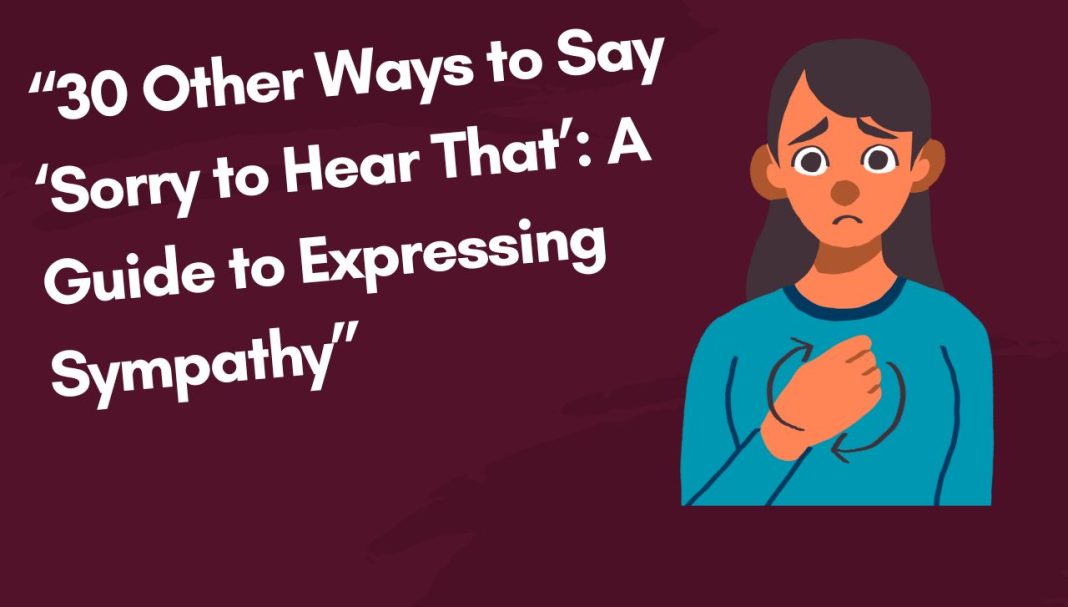We’ve all been there—someone shares bad news, and the words “Sorry to hear that” come tumbling out. It’s not wrong, just…overused. Repeating the exact phrase can feel impersonal or even robotic when you genuinely want to show someone you care. That’s why finding other ways to express sympathy matters. Whether it’s a friend, coworker, or neighbor, a heartfelt message—phrased differently—can go a long way in offering absolute comfort.
“Sorry to Hear That” Meaning
Let’s start with the basics. What does “Sorry to hear that” actually mean?
At its core, it’s a quick way of expressing sympathy. You acknowledge that someone shared something painful or difficult and want them to know you care. The “sorry” doesn’t mean you’re taking blame—it’s more about shared human compassion. The phrase is often used when someone tells you about a loss, disappointment, illness, or personal struggle.
For example:
- “My grandmother passed away last night.”
- “Oh no, I’m sorry to hear that.”
It’s sincere, but because it’s so common, it can sometimes come off a bit automatic—especially in text or emails.
When to Use “Sorry to Hear That”
You’ll often hear this phrase in both casual and formal settings. It’s a safe go-to for when someone shares unfortunate, painful news, or just hard news.
Situations might include:
- A death in the family
- Losing a job or opportunity
- Breakups or relationship issues
- Health struggles
- General bad news (like canceled plans, disappointments, or accidents)
The beauty of “Sorry to hear that” is its versatility. It’s appropriate for friends and coworkers and works in spoken or written form. But here’s the thing—sometimes it feels too generic.
Why Say “Sorry to Hear That”?
Honestly? Because people want to feel heard and seen. You don’t need the perfect words, but acknowledging someone’s pain or trouble helps build connection. A short, empathetic response shows that you’re emotionally present.
Even if it’s simple, saying something is better than staying silent. Imagine opening up to someone and being met with awkward silence or a subject change. Not great, right?
But sympathy doesn’t need to be robotic. You can express genuine concern in more personal and less rehearsed ways. That’s where these alternatives come in.

Other ways to say “sorry to hear that meaning”
| Alternative Phrase | Meaning / Tone |
|---|---|
| 1. I’m sorry to hear that | Expression of sympathy or regret |
| 2. That’s unfortunate | Acknowledging a negative situation |
| 3. Oh no, that’s terrible | Shows concern and empathy |
| 4. I can’t imagine how tough that must be | Deep empathy and understanding |
| 5. My heart goes out to you | Emotional support and compassion |
| 6. That must be really hard | Acknowledging the difficulty of the situation |
| 7. I’m here for you | Offering emotional support |
| 8. That’s really sad to hear | Expressing sorrow |
| 9. I’m deeply sorry | Strong expression of sorrow or regret |
| 10. That’s tough | Informal way of showing sympathy |
| 11. I hope things get better soon | Hopeful and supportive |
| 12. That’s not easy | Recognizing a challenging situation |
| 13. I’m sending you positive thoughts | Uplifting support |
| 14. That’s really upsetting | Shared emotional reaction |
| 15. I wish I could help | Feeling helpless but wanting to support |
| 16. That’s heartbreaking | A strong emotional reaction to sad news |
| 17. I’m truly sorry | Sincere expression of regret |
| 18. That sounds awful | Acknowledging the severity of the situation |
| 19. What a tough break | Colloquial way of expressing sympathy |
| 20. That’s a real shame | Mild expression of disappointment and empathy |
| 21. I’m thinking of you | Thoughtful, caring gesture |
| 22. That can’t be easy | Empathetic acknowledgment |
| 23. I feel for you | Expressing compassion |
| 24. Wishing you strength | Encouragement during a hard time |
| 25. That’s really rough | Informal, empathetic |
| 26. I’m so sorry you’re going through this | Deep sympathy for ongoing hardship |
| 27. That’s painful to hear | Personal reaction to bad news |
| 28. That must be overwhelming | Acknowledging emotional burden |
| 29. You have my sympathy | Formal way to offer condolences or sorrow |
| 30. I’m saddened to hear that | Formal and emotional response to negative news |
Conclusion
Empathy isn’t about perfect words but presence, tone, and intent. Still, having more than one way to say “Sorry to hear that” helps you connect with others more authentically. Thoughtful phrasing makes a difference if you’re offering support casually or in a more serious context. So next time someone opens up, you’ll have the right words and heart to meet them there.

Grammar Nerd, ESL Trainer, Low-Key Comma Crusader
Daniel has taught English for over a decade, from small community classes in Oaxaca to bustling university halls in London. He has a knack for turning even the driest grammar points into relatable, real-life language tools—think fewer red pens, more real talk. He co-founded Grammation to make grammar less gatekeeper-y and more global. When he’s not decoding sentence structures, he’s probably hiking with a paperback novel or adding unnecessary hyphens for fun.
“The rules of grammar should empower people—not trip them up.”


